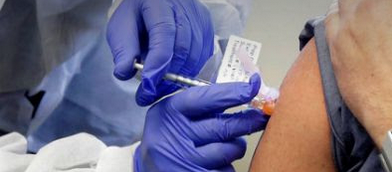
As dozens of companies and universities rush to develop a coronavirus vaccine, the U.S. will also have to grapple with who will get a vaccine first once it’s been approved by the Food and Drug Administration.
The Centers for Disease Control and Prevention’s Advisory Committee on Immunization Practices has historically made decisions on who is first to be immunized and whom the vaccine works best for, USA Today reported. The ACIP issues guidelines on whom vaccines should be distributed to, and how and when they get it.
“It’s inevitable that the vaccine will come out more slowly than we like. We’re not going to have 350 million doses delivered day one,” Andrew Pavia, chief of pediatric infectious diseases at the University of Utah, told USA Today.
Experts say the vaccine may be first given to the people most at risk of contracting the coronavirus or developing serious symptoms if infected.
“It could be groups with underlying health conditions, or people who, because of the kind of work they’re doing, can’t avoid contact—like health care workers, police officers, grocery store workers,” Andreas Handel, an infectious disease modeler at the University of Georgia, told Wired.
One solution could be to have multiple vaccines available at once, experts say.
“History tells us that the first vaccines that get licensed generally are not the ones that are widely used. They usually get replaced after a couple years,” Peter Hotez, dean of the National School of Tropical Medicine at Baylor College of Medicine, told Wired. “We improve on them.”
Biotech company Moderna announced Monday that the first coronavirus vaccine tested in people can “stimulate an immune response against the virus,” The New York Times reported.
The announcement came after the company says it tested a coronavirus vaccine on 45 healthy people between the ages of 18 and 55 and found eight of their bodies “elicited neutralizing antibodies, according to The New York Times.
The antibodies matched or surpassed the antibody levels in recovered COVID-19 patients, the newspaper reported. Pfizer and partner BioNTech, Chinese company CanSino, University of Oxford, and dozens of other companies are also reportedly creating their own vaccines.
President Trump unveiled his effort, called “Operation Warp Speed,” to fast-track the development of a coronavirus vaccine by January, NPR reported.
“We’re looking to get it by the end of the year if we can, maybe before,” Trump said on Friday, according to NPR.
Dr. Anthony Fauci, the country’s leading infectious disease expert on the White House Coronavirus Task Force, said during a March 30 briefing that he thinks the vaccine will be ready for the public in 12 to 18 months.
“If we start seeing an efficacy signal, we may be able to even use a vaccine at the next season,” he said. “So things are going to be very, very different.”
Fauci has also warned about rushing a vaccine before it’s ready.
Fauci said during his testimony to Congress on Tuesday that there could be repercussions to rushing vaccine trials, McClatchy News reported.
“I must warn that there’s also the possibility of negative consequences where certain vaccines can actually enhance the negative effect of the infection,” he said. “The big unknown is efficacy. Will it be present or absent, and how durable will it be.”